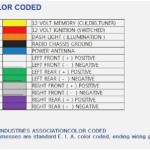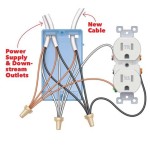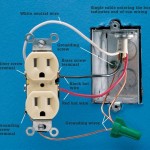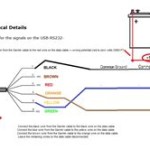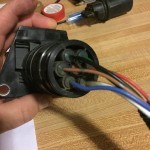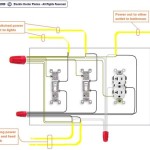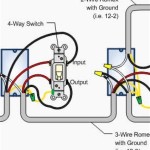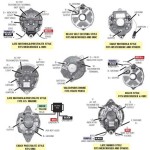A trailer hitch wiring harness is a critical component in connecting a towing vehicle to a trailer. It provides a safe and reliable electrical connection between the two vehicles, allowing for the proper functioning of trailer lights, brakes, and other electrical accessories.
Trailer hitch wiring harnesses have become increasingly important as trailers become more sophisticated and require more electrical power. They help prevent accidents by ensuring that all lighting and brake systems are functioning correctly, improving visibility and overall safety on the road.
One key historical development in trailer hitch wiring harnesses was the introduction of standardized color-coded wiring in the 1970s. This standardization made it easier for installers to connect the correct wires, reducing the risk of errors and ensuring a more reliable connection.
This article will delve deeper into the different types of trailer hitch wiring harnesses available, their installation process, and troubleshooting common issues. By providing this information, we aim to empower readers with the knowledge and skills necessary to choose, install, and maintain trailer hitch wiring harnesses, ensuring safe and reliable towing experiences.
Trailer Hitch Wiring Harnesses are essential components that ensure the safe and reliable connection between towing vehicles and trailers. They are composed of multiple key aspects that work together to provide electrical power and functionality to the trailer’s lighting, braking, and other electrical systems.
- Compatibility: Ensures seamless connection between specific vehicle and trailer models.
- Wiring Gauge: Determines the thickness and current-carrying capacity of the wires.
- Circuit Protection: Protects against electrical overloads and short circuits.
- Connector Type: Facilitates the connection between the vehicle and trailer wiring systems.
- Length: Varies based on the distance between the towing vehicle’s hitch and the trailer’s electrical components.
- Installation Method: Can be plug-and-play or require splicing into the vehicle’s wiring system.
- Durability: Ensures resistance to environmental factors and wear and tear.
- Compliance: Adheres to industry standards and regulations for safe and legal operation.
These key aspects are interconnected and vital for the proper functioning of trailer hitch wiring harnesses. Compatibility ensures a secure fit, while wiring gauge and circuit protection prevent electrical issues. Connector type and length determine ease of installation and functionality, and installation method affects the complexity of the setup. Durability ensures longevity, and compliance guarantees adherence to safety standards. Understanding these aspects empowers individuals to choose the right wiring harness for their specific needs, ensuring a safe and reliable towing experience.
Compatibility
Within the context of Trailer Hitch Wiring Harnesses, compatibility plays a crucial role in ensuring a safe and efficient connection between towing vehicles and trailers. Compatibility encompasses various factors that contribute to the seamless functioning of the electrical systems between the two entities.
- Vehicle-Specific Design: Trailer hitch wiring harnesses are designed specifically for particular vehicle models, ensuring a precise fit and compatibility with the vehicle’s electrical system.
- Trailer Compatibility: Harnesses are also designed to match the electrical requirements and specifications of different trailer models, accommodating variations in lighting, braking, and other electrical systems.
- Connector Matching: Compatibility extends to the connectors used in the wiring harness, which must align with the corresponding connectors on both the vehicle and trailer, ensuring a secure and reliable connection.
- Plug-and-Play Functionality: Ideally, trailer hitch wiring harnesses should offer plug-and-play functionality, eliminating the need for complex wiring modifications or splicing, enhancing ease of installation and reducing the risk of errors.
By considering these facets of compatibility, individuals can select the correct wiring harness for their specific vehicle and trailer combination, ensuring optimal performance, safety, and compliance with industry standards. Compatibility serves as the foundation for a robust and reliable electrical connection between towing vehicles and trailers, enabling the safe and efficient operation of essential electrical systems.
Wiring Gauge
Within the context of Trailer Hitch Wiring Harnesses, wiring gauge plays a critical role in ensuring the safe and efficient transmission of electrical power between towing vehicles and trailers. Wiring gauge refers to the thickness of the wires used in the harness, which directly affects their current-carrying capacity. The thicker the wire, the lower its gauge number, and the greater its ability to carry electrical current.
The selection of appropriate wiring gauge is crucial for the proper functioning of trailer hitch wiring harnesses. Inadequate wire gauge can lead to excessive resistance, resulting in voltage drop, power loss, and potential overheating. This can compromise the functionality of trailer lights, brakes, and other electrical accessories, posing safety hazards and impairing the overall towing experience.
Conversely, using wiring gauge that is too thick can be unnecessarily expensive and bulky, making the harness less manageable and potentially more difficult to install. Therefore, it is essential to choose the correct wiring gauge that meets the specific electrical requirements of the towing vehicle and trailer combination.
Real-life examples further illustrate the importance of wiring gauge in trailer hitch wiring harnesses. For instance, a trailer with multiple high-power LED lights and an electric brake system will require a heavier gauge wire to handle the higher current draw compared to a trailer with only basic lighting and no electrical brakes.
Understanding the connection between wiring gauge and trailer hitch wiring harnesses empowers individuals to make informed decisions when selecting and installing these critical components. By choosing the appropriate wiring gauge, they can ensure optimal electrical performance, safety, and longevity of their towing systems.
Circuit Protection
Within the realm of Trailer Hitch Wiring Harnesses, circuit protection stands as a critical component, safeguarding against electrical overloads and short circuits that could compromise the integrity of the electrical system. Electrical overloads occur when excessive current flows through the circuit, while short circuits arise when current takes an unintended path, bypassing resistors and other circuit elements.
Circuit protection devices, such as fuses or circuit breakers, are incorporated into trailer hitch wiring harnesses to interrupt the flow of current in the event of an overload or short circuit. Fuses operate on the principle of melting a thin wire when excessive current passes through it, effectively breaking the circuit. Circuit breakers, on the other hand, use a spring-loaded mechanism to trip and open the circuit when current exceeds a predetermined threshold.
Real-life examples underscore the importance of circuit protection in trailer hitch wiring harnesses. A loose connection or faulty wiring can lead to an electrical overload, potentially causing a fire or damage to the towing vehicle or trailer. Similarly, a short circuit can create a direct path for current to flow, bypassing the intended circuit and potentially causing overheating or damage to electrical components.
Understanding the connection between circuit protection and trailer hitch wiring harnesses empowers individuals to appreciate the significance of proper installation and maintenance. By ensuring that circuit protection devices are functioning correctly, they can minimize the risk of electrical hazards, enhance the longevity of their towing systems, and maintain a safe and reliable connection between their towing vehicles and trailers.
Connector Type
Within the context of Trailer Hitch Wiring Harnesses, connector type plays a vital role in establishing a secure and reliable electrical connection between towing vehicles and trailers. The type of connector used determines the ease of installation, compatibility with different vehicle and trailer models, and overall performance of the wiring harness.
- Standard Socket and Plug Connectors: These are commonly used connectors that feature a male plug on the vehicle side and a female socket on the trailer side. They are relatively easy to install and provide a secure connection. However, they may not be suitable for all vehicle and trailer combinations.
- Round Pin Connectors: Round pin connectors utilize multiple pins to establish the electrical connection. They are known for their durability and resistance to corrosion, making them ideal for heavy-duty towing applications.
- Flat Blade Connectors: Flat blade connectors are commonly found in smaller trailers and provide a simple and cost-effective connection method. However, they may not be as robust as other connector types.
- Custom Connectors: Some vehicle and trailer manufacturers use proprietary connector types that are designed specifically for their products. These connectors ensure optimal compatibility but may limit the interchangeability of wiring harnesses.
Choosing the appropriate connector type for a Trailer Hitch Wiring Harness is crucial for ensuring proper electrical functionality, safety, and longevity of the towing system. Understanding the different types of connectors available and their respective advantages and disadvantages empowers individuals to make informed decisions when selecting and installing wiring harnesses for their specific towing needs.
Length
The length of a Trailer Hitch Wiring Harness is directly related to the distance between the towing vehicle’s hitch and the trailer’s electrical components. This length variation is a crucial aspect of the wiring harness design, ensuring that there is sufficient slack to accommodate different vehicle and trailer combinations.
Real-life examples further illustrate the importance of length variation in Trailer Hitch Wiring Harnesses. Consider a pickup truck towing a small utility trailer. In this scenario, a shorter wiring harness would suffice, as the distance between the hitch and the trailer’s electrical components is relatively small. Conversely, when towing a large travel trailer with a motorhome, a longer wiring harness is necessary to bridge the greater distance between the two connection points.
Understanding the connection between length variation and Trailer Hitch Wiring Harnesses empowers individuals to select the correct harness for their specific towing needs. By matching the harness length to the distance between the towing vehicle and trailer, they can ensure proper electrical connectivity, prevent strain on the wires, and maintain a safe and reliable towing experience.
Installation Method
The installation method of a Trailer Hitch Wiring Harness plays a critical role in determining its ease of use, compatibility, and overall effectiveness. Plug-and-play harnesses offer a simple and convenient installation process, while spliced harnesses require a more complex and time-consuming approach.
Plug-and-play Trailer Hitch Wiring Harnesses are designed to connect directly to the vehicle’s existing wiring system without the need for cutting or splicing wires. This makes them ideal for individuals who want a quick and hassle-free installation. However, plug-and-play harnesses may not be compatible with all vehicle models or may require additional adapters for certain applications.
Spliced Trailer Hitch Wiring Harnesses, on the other hand, require the installer to cut into the vehicle’s wiring system and splice the harness wires directly. This method is more complex and time-consuming, but it allows for greater customization and flexibility. Spliced harnesses are often used in situations where a plug-and-play harness is not available or when the installer wants to integrate additional features or accessories into the wiring system.
Understanding the connection between installation method and Trailer Hitch Wiring Harnesses empowers individuals to make informed decisions about the best type of harness for their specific needs. Plug-and-play harnesses offer ease of installation, while spliced harnesses provide greater customization and flexibility. By carefully considering the installation method and compatibility with their vehicle, individuals can ensure a safe and reliable electrical connection between their towing vehicle and trailer.
Durability
Durability is a critical aspect of Trailer Hitch Wiring Harnesses, ensuring their ability to withstand the harsh environmental conditions and physical demands encountered during towing operations. Durable wiring harnesses resist corrosion, moisture, UV radiation, and extreme temperatures, ensuring reliable electrical connections over an extended lifespan.
Real-life examples underscore the importance of durability in Trailer Hitch Wiring Harnesses. In regions with heavy rainfall or coastal environments, exposure to moisture can lead to corrosion and electrical malfunctions. Similarly, in areas with extreme temperature variations, wiring harnesses must endure both freezing cold and scorching heat without compromising their integrity.
Understanding the connection between durability and Trailer Hitch Wiring Harnesses empowers individuals to select and install wiring harnesses that can withstand the specific environmental conditions they will encounter. By choosing durable harnesses, they can minimize the risk of electrical failures, ensure safe and reliable towing experiences, and extend the lifespan of their towing systems.
In summary, durability plays a pivotal role in Trailer Hitch Wiring Harnesses, safeguarding against environmental degradation and wear and tear. By understanding this connection, individuals can make informed decisions when selecting and installing wiring harnesses, ensuring reliable electrical connections and enhanced safety during towing operations.
Compliance
In the realm of Trailer Hitch Wiring Harnesses, compliance with industry standards and regulations is paramount for ensuring safe and legal operation during towing activities. Adherence to these guidelines guarantees that wiring harnesses meet specific safety criteria, undergo rigorous testing, and comply with established electrical and mechanical requirements.
Compliance with industry standards, such as those set forth by the Society of Automotive Engineers (SAE) and the National Highway Traffic Safety Administration (NHTSA), is a critical component of Trailer Hitch Wiring Harnesses. These standards dictate essential parameters related to wire gauge, circuit protection, connector types, and overall system performance. By adhering to these standards, manufacturers ensure that wiring harnesses are designed, constructed, and tested to deliver reliable and safe electrical connections between towing vehicles and trailers.
Real-life examples further underscore the importance of compliance in Trailer Hitch Wiring Harnesses. Non-compliant wiring harnesses may lack proper insulation, inadequate circuit protection, or substandard connectors, increasing the risk of electrical failures, shorts, and even fires. These failures can jeopardize the safety of both the towing vehicle and the trailer, potentially leading to accidents or injuries.
Understanding the connection between compliance and Trailer Hitch Wiring Harnesses empowers individuals to make informed decisions when selecting and installing these critical components. By choosing compliant wiring harnesses, they can ensure adherence to safety regulations, minimize electrical hazards, and maintain a reliable and legal towing system. This understanding also enables individuals to identify and avoid non-compliant harnesses, which may compromise safety and expose them to legal liabilities.










Related Posts

